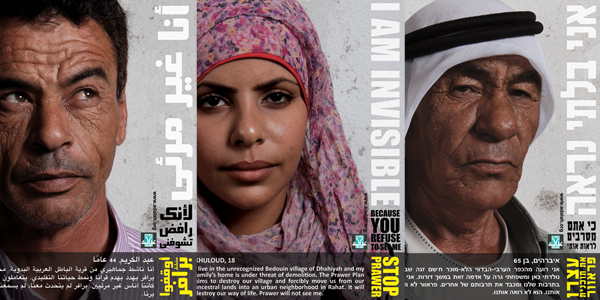In September 2011, the Israeli government approved the Prawer Plan for mass expulsion of the Arab Bedouin community in the Naqab (Negev) desert. If fully implemented, this plan will result in the forced displacement of up to seventy thousand Arab Bedouin citizens of Israel and the destruction of thirty-five “unrecognized” villages. Despite the Arab Bedouin community`s complete rejection of the plan and strong disapproval from the international community and human rights groups, the Prawer Plan is happening now. More than a thousand homes were demolished in 2011 and in August a special police force is slated to officially begin implementing the plan, and demolish even more. Adalah and our NGO partners have been challenging the Prawer Plan before courts, government authorities and the international community, but we need your help to stop what would be the largest single act of forced displacement of Arab citizens of Israel since the 1950s!
What is the Prawer Plan?
Arab Bedouin citizens of Israel, inhabitants of the Naqab (Negev) desert since the seventh century, are the most vulnerable community in Israel. For over sixty years, the indigenous Arab Bedouin have faced a state policy of displacement, home demolitions and dispossession of their ancestral land. Today, seventy thousand Arab Bedouin citizens live in thirty five villages that either predate the establishment of the state in 1948, or were created by Israeli military order in the early 1950s. The State of Israel considers the villages “unrecognized” and the inhabitants “trespassers on state land,” so it denies the citizens access to state infrastructure like water, electricity, sewage, education, health care and roads. The state deliberately withholds basic services from these villages to “encourage” the Arab Bedouin citizens to give up their ancestral land.
In September 2011, the Israeli government approved the Prawer Plan, the brainchild of former Deputy Chair of the National Security Council, Mr. Ehud Prawer. If implemented, the Prawer Plan will result in the destruction of the unrecognized villages and the forced displacement of up to seventy thousand Arab Bedouin citizens. This plan was completed without consultation of the local community, and is a gross violation of the constitutional rights of the Arab Bedouin citizens to property, dignity, equality, adequate housing, and freedom to choose their own residence.
Prawer is Happening Now
Despite complete rejection of the plan by the Arab Bedouin, and strong disapproval from the international community, Prawer is happening now. Media reports indicate that on 1 August 2012, a special police force will begin work to implement Prawer and demolish homes. More than one thousand houses were demolished in 2011 alone, and civil society is seeing the same practices in 2012. Since Prawer was announced, the government announced plans that will displace over ten thousand people and plant forests, build military centers, and establish new Jewish settlements in their place.
In March 2012, the UN Committee on the Elimination for Racial Discrimination called on Israel to withdraw the proposed implementing legislation of the Prawer Plan, on the grounds that it was discriminatory. If Israel applied the same criteria for planning and development that exist in the Jewish rural sector, all thirty-five unrecognized villages would be recognized where they are.
In July 2012, the European Parliament passed a historic resolution calling on Israel to stop the Prawer Plan and its policies of displacement, eviction, and dispossession.
Adalah Calls on the Israeli Government to:
- Cancel the Prawer Plan
- Recognize the “unrecognized villages” and the land claims of the indigenous Arab Bedouin community
- Halt home demolitions and forced evictions
- Engage in meaningful dialogue with the Arab Bedouin community and the Arab political leadership to justly resolve the land claims
- Invest in greater health, education, and employment opportunities for Arab Bedouin citizens of Israel
Watch the Video:
Please sign our petition and visit our website and campaign page to find out what you can do to Stop the Prawer Plan!
Resources:
- Briefing Paper: Analysis of the Prawer Plan
- Briefing Paper: The Prawer Plan Bill
- Adalah and ACRI Press Release: Prawer Plan Law Violates Rights of Bedouin
- Four Reasons to Reject the Prawer Plan
- The Arab Bedouin: Myths and Misconceptions
- UN CERD Calls on Israel to Withdraw the Prawer Plan Law
- European Parliament Pass Resolution Calling on Israel to Stop the Prawer Plan